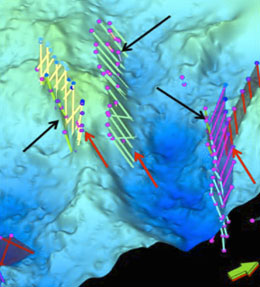




Motivation for the Congress
 Stratigraphy, the study of the spatial and temporal arrangement of geological formations and the geological events that they represent, is one of the fundamental disciplines of Earth Sciences. It has been enhanced in recent decades by the emergence of techniques, methods, and concepts such as seismic stratigraphy, genetic stratigraphy, cyclostratigraphy, geochronological and radiochronological dating, statistical biostratigraphy, magnetostratigraphy, and 3-D modelling. Many of these methods have been supported by increasingly powerful computer hardware and software tools. The resulting research in the discipline has led to numerous advances in stratigraphic studies, which have informed our understanding of both pure and applied scientific problems.
Stratigraphy, the study of the spatial and temporal arrangement of geological formations and the geological events that they represent, is one of the fundamental disciplines of Earth Sciences. It has been enhanced in recent decades by the emergence of techniques, methods, and concepts such as seismic stratigraphy, genetic stratigraphy, cyclostratigraphy, geochronological and radiochronological dating, statistical biostratigraphy, magnetostratigraphy, and 3-D modelling. Many of these methods have been supported by increasingly powerful computer hardware and software tools. The resulting research in the discipline has led to numerous advances in stratigraphic studies, which have informed our understanding of both pure and applied scientific problems.
Stratigraphy has made important advances in reconstructing paleo-environmental conditions (at local, regional, and continental scales), in inferring the nature and speed of past climate changes, and in refining the geological time scale. The applied benefits of stratigraphic studies are becoming increasingly apparent and important. Applications of the discipline are multiple and include: prospecting for hydrocarbons, groundwater, mineral deposits, and building materials; reconstructing past climates on the basis of which future climate change scenarios can be inferred; and characterizing hazards and associated risks arising from events and processes such as tsunamis, coastal flooding, and sea level rise.
As such, Stratigraphy as a discipline has assumed a crucial point not only with respect to the development of the discipline itself but also in its contribution to the economic and environmental well-being of humankind. Therefore, it is opportune to mark this point in the knowledge, progress and prospects of Stratigraphy by establishing an International event. It is in this spirit that the 1st International Congress on Stratigraphy (STRATI 2013) will be held in Lisbon in 2013, with the conference programme and meetings running from 2 to 4 July, and pre- and post-conference field trips also being held.
